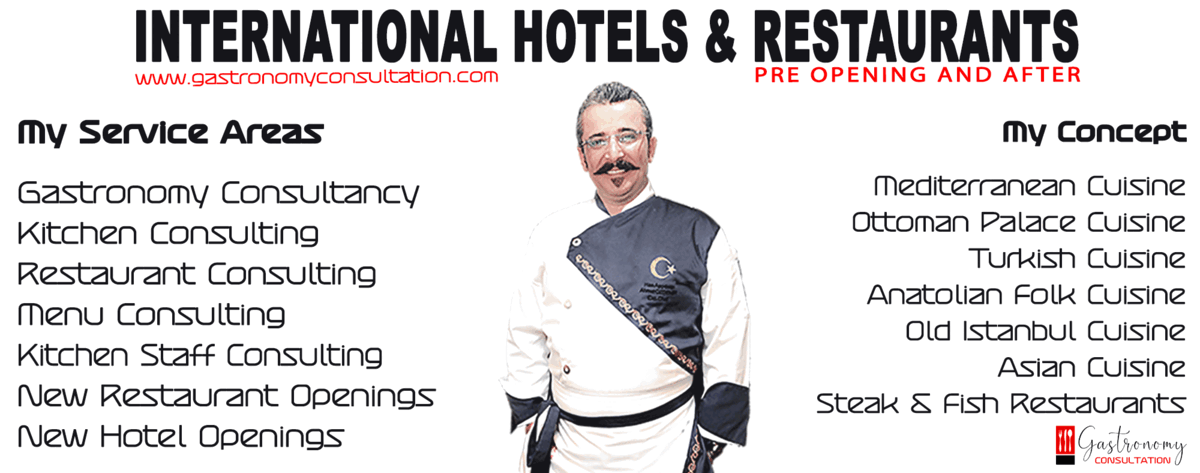What Should Restaurant Businesses Do in Economic Troubles? How is Emergency Policy Implemented in Restaurants? What Measures Do Emergency Policies Require for Restaurants? Threat Assessment, Communication Plan, Business Continuity Plan, Training and Exercises, Financial Situation Analysis, Reducing Expenses, Increasing Revenues, Financial Planning, Expert Help, A restaurant emergency policy is a policy that specifies how to act in the event of a particular crisis or emergency...
01/15/2021
 What is an Emergency Plan in Restaurants? How to Implement an Emergency Plan in Restaurants?
What is an Emergency Plan in Restaurants? How to Implement an Emergency Plan in Restaurants?
Coord. Chef Ahmet ÖZDEMİR
What Should Restaurant Businesses Do in Economic Troubles? How is Emergency Policy Implemented in Restaurants? What Measures Do Emergency Policies Require for Restaurants?
In restaurants, a contingency plan refers to a strategic plan that the business prepares to deal with unexpected events or crisis situations. This plan aims to ensure the restaurant's personnel, customer and property safety, maintain business continuity and respond effectively and quickly in emergencies. Here are some key points to consider when creating an
emergency plan for restaurants:
Threat Assessment:
The first step is to identify emergencies and threats to which your business may be exposed. This can include events such as natural disasters, fire, terrorist attack, flooding. Identifying and assessing your threats will make your contingency plan more effective.
Team Building:
Establish an emergency management team to execute and manage the contingency plan. This team should consist of employees from different parts and levels of the business. The roles and responsibilities of each member should be clearly defined.
Communication Plan:
Communication is important in an emergency. You may need to communicate with both employees and customers. Determine the communication methods to be used in an emergency. For example, you can place a board with meeting points and emergency instructions in a specific area. It is also important that you keep employee contact information up to date.
Business Continuity Plan:
Make plans to maintain business continuity in the event of an emergency. For example, your business may need to operate temporarily in a different location, or you may need to identify a secure storage method to back up your data. Your business continuity plan will help you minimize the damage to your business in the event of a crisis.
Training and Exercises:
Organize regular training and drills so that your staff understand the contingency plan and protocols. This will ensure that your staff can react properly. Drills are an important opportunity to test and improve your contingency plan.
Restaurant businesses can take the following steps in dealing with economic troubles:
Financial Situation Analysis:
The first step is to carefully analyze the financial situation of the business. Review income and expenses, monitor your cash flow and evaluate your profit margins. This analysis will help you identify the causes of financial problems and create a better financial strategy.
Reducing Expenses:
Make a plan for reducing the costs of your business. This may include measures such as reviewing personnel costs, optimizing energy and water consumption, re-evaluating supplier agreements. Identify unnecessary expenses and try to reduce them.
Increasing Revenues:
Develop strategies to create new sources of income or increase existing ones. These may include increasing marketing and advertising activities, introducing new menus or promotions, expanding your audience, or offering services such as takeaways.
Financial Planning:
Create a long-term financial plan and identify the steps to help your business meet its financial goals. This can mean creating budgets, planning investments, and developing strategies for managing future risks.
Expert Help:
If your business is experiencing serious financial difficulties, you may want to consider consulting a financial advisor. An expert can assess your business' finances, suggest strategies, and guide you.
A restaurant emergency policy is a policy that specifies how to act in the event of a particular crisis or emergency. This policy aims to ensure the safety of personnel, customers and the business, to minimize the effects of the emergency and to ensure a rapid response. You may need to take the following measures to implement the emergency policy:
Emergency Plan:
Create a pre-prepared contingency plan. This plan should contain detailed instructions and procedures for different scenarios. It is important that personnel know the emergency plan and understand how to implement it.
What Should Restaurant Businesses Do in Economic Deviations across the Country?
Economic devaluations are difficult periods that are often associated with factors such as economic recessions, high inflation, currency depreciation. Restaurant businesses can take the following measures to deal with such economic challenges:
Review Financial Situation:
Carefully analyze the financial situation of your business. Review income and expenses, monitor your cash flow, and look for opportunities to reduce costs. This analysis will help your business understand the financial challenges and take the right action.
Reduce Expenses:
Make a plan for reducing the costs of your business. This may include measures such as reviewing personnel costs, optimizing energy and water consumption, re-evaluating supplier agreements. Identify unnecessary expenses and try to reduce them.
Increase Efficiency:
Develop strategies to increase the efficiency of your business. Strengthen staff training, improve business processes and implement efficient working methods. This will both reduce costs and improve customer service quality.
Focus on Marketing:
Pay more attention to your marketing and advertising activities. Use effective marketing strategies to attract customers to your business in a time of intense competition. You can increase customer loyalty through methods such as special offers, discounts or loyalty programs.
Find Creative Solutions:
Look for creative and innovative solutions. For example, you can direct your business to another segment or target audience, offer catering services or use online sales channels. Search for new business opportunities and generate potential sources of income.
Seek Financial Support:
Seek financial support to deal with economic difficulties. You can seek help from sources such as banks, government grants or investors. Investigate appropriate financial support options, taking into account the financial situation of your business and potential risks.
Remember, every business situation is different, so tailor your strategies to your business needs and resources. At the same time, don't forget to focus on customer satisfaction and quality service, because customer loyalty and positive word of mouth can help your business grow.

How can financial and economic "crises" be turned into opportunities in restaurant businesses?
Financial and economic crises can be a challenging time for restaurant businesses. However, with the right strategies and approaches, it may be possible to turn crises into opportunities. Here are some suggestions for restaurant businesses to turn financial and economic crises into opportunities:
Optimize costs:
Review your costs and reduce unnecessary expenses in times of crisis. By negotiating with suppliers, you can reduce costs, prevent waste and increase efficiency.
Develop creative marketing strategies:
Marketing budgets are often constrained in times of crisis. However, you can expand your customer base with creative and cost-effective marketing strategies. Announce your presence through methods such as social media, digital ads, participation in local events.
Re-evaluate the menu:
Review the menu to cut costs. You can control costs by using more economical and local products. At the same time, you can offer a diversified and attractive menu, taking into account the demands of the customers.
Increase takeout or delivery services:
In times of crisis, people may tend to stay at home more. Therefore, you can provide more reach to your customers by increasing takeaway or delivery services. You can collaborate with online ordering systems and third-party delivery platforms.
Maintain a loyal customer base:
In times of crisis, the value of loyal customers becomes even more important. Retain loyalty with strategies like rewarding loyal customers, offering discounts or providing special offers. At the same time, improve service quality by paying attention to customer feedback and complaints.
Create collaborations and partnerships:
You can create synergies by collaborating with other businesses. For example, you can develop joint projects with local grocery stores, caterers or other restaurants. Thus, together you can reach a larger customer base.
Emphasize staff training and motivation:
It is important to keep the motivation of your staff high and to train them in times of crisis. Well-trained and motivated employees can increase customer satisfaction and increase productivity.
Focus on innovation:
Times of crisis are times when innovative solutions are needed. Encourage innovative ideas in your business, leverage technology tools to improve processes, and be flexible to respond quickly to customers' changing needs.
Each crisis period is unique and businesses may need to implement different strategies to deal with these processes. It may also be beneficial to seek support from crisis management experts or industry-experienced people to develop strategies that suit your business' specific situation and goals.